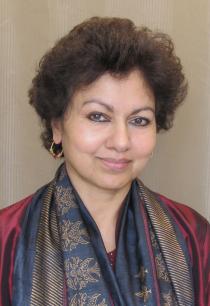Vancouver-based Commonwealth of Learning (COL) – hosted by the federal government and supported by seven major donor governments, including Canada and most of the Commonwealth’s 54 member countries – is the world’s only intergovernmental organization solely dedicated to promoting and developing distance education and open learning.

Professor Asha S. Kanwar, COL President and Chief Executive Officer, tells us how COL is helping to improve opportunities for learning through the application of open, distance and technology-mediated teaching methods.
1) How does the Commonwealth of Learning improve access to distance education and online learning, particularly for disadvantaged people in developing Commonwealth countries?
We often make these connections by working with educational institutions to reach the unreached sections of society. For example, Shahnaz, a young girl in Pakistan was thrown out of her husband’s house when she gave birth to a girl instead of a boy. After returning home to her poor parents she met her former teacher, with whom Shahnaz had completed eight years of schooling. Her teacher advised her to enroll as a distance learning student with the Allama Iqbal Open University (AIOU) –one of COL’s partners. Shahnaz completed school, set up her own sewing business, and helped her sister to continue her education. She also dreams of sending her own daughter to an English school one day. Many girls like Shahnaz benefit from distance learning because it’s both affordable and flexible.
Another COL program – Lifelong Learning for Farmers (L3F) – strengthens livelihoods and empowers the poorer sections of rural societies in many Commonwealth countries. Under the L3F model, COL is a catalyst in bringing together communities, institutions, civil society and the private sector to build the capacity of the goat-herders and farmers through gender-sensitive open and distance learning.
2) Tell us about COL’s work with UNESCO in the area of Open Educational Resources (OER).
COL and UNESCO, with funding support from the William and Flora Hewlett Foundation, embarked on a major initiative to encourage more governments to adopt policies that encourage OER. Our joint commitment to “Fostering Governmental Support for OER Internationally” increased understanding of the significance of OER and gathered support for the principle that the products of publicly funded work should carry open licenses. COL and UNESCO received approval for the Paris Declaration on OER at UNESCO’s World OER Congress in June 2012. The Paris Declaration is a commitment to supporting the use of OER to expand access to education and contains 10 recommendations to advance the development and use of OER.
Since the adoption of the Paris Declaration, COL has been actively working with UNESCO to implement the recommendations, with a particular focus on five areas: awareness and advocacy, policy development, capacity building, research and sharing.
3) COL has several Honorary Chairs in Open and Distance Learning, sometimes in collaboration with UNESCO. How do these Honorary Chairs (all of whom seem to have a great deal of experience in the fields of OER and Online Education) support COL (and UNESCO)?
Our Honorary Chairs in Open and Distance Learning and OER have been carefully chosen. Honorary Chairs work with national agencies and educational institutions to conduct studies, surveys and research on the current status and emerging trends in open and distance learning and technology-enhanced education and training at all levels. Canada-based Dr. Rory McGreal is the UNESCO_COL Chair in OER at Athabasca University.
4) You’ve done a great deal of research around gender studies – in particular the impact of distance education on the lives of Asian women. How has your research helped the COL to improve educational opportunities for women in developing countries? Are strides being made in this area or is there still a great deal to be done?
One-third of the world’s poor live in Commonwealth countries and two-thirds of them are women. COL recognizes that advancement of the goals of gender equality and women’s empowerment is central to its agenda of learning for development. As a cross-cutting corporate goal for COL, gender equality requires that both women’s and men’s views, interests and needs shape our programs. Open and distance learning can be especially helpful in enabling women and girls to access educational opportunities while also fulfilling other responsibilities –consider Shahnaz’s story.
Given the violence that continues to surface against women in many Commonwealth countries, much more research is required. But we need constant advocacy for gender equality at all levels—starting from early schooling right on to tertiary education.
5) How do organizations like BCcampus help to support COL’s mandate for improving access to online and distance educational opportunities?
BCcampus is a strong advocate for OER on the world scene, which supports COL’s goals in this area. BCcampus has also collaborated with COL on several publications that are distributed, referenced and in use around the world.
